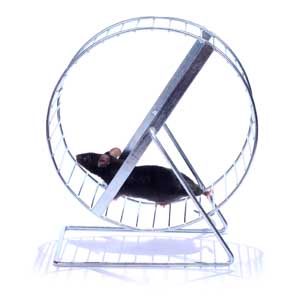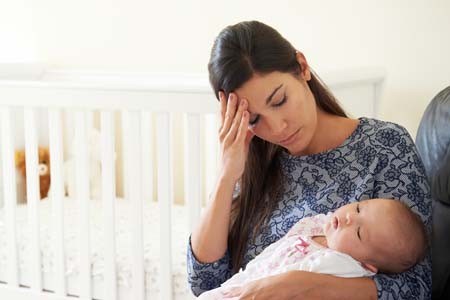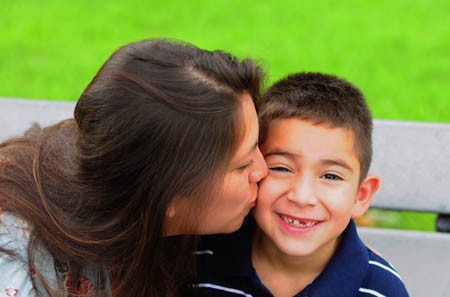Allopregnanolone Injection Eliminated Post-Partum Depression in Four Women
In a small proof-of-concept study, researcher Stephen J. Kanes and colleagues showed that injections of allopregnanolone could nearly eliminate symptoms of post-partum depression.
Allopregnanolone is the main metabolite of the hormone progesterone. Rapid changes in hormone levels following delivery are thought to cause post-partum depression.
In the study, four women with post-partum depression were given injections of SAGE-547, a proprietary solution of allopregnanolone. The dose was adjusted over 12 hours until it approximated prenatal levels of allopregnanolone. This level was maintained for 36 hours, and then the women were weaned off the SAGE-547 over another 12 hours. As soon as the women began injections of SAGE-547, their depression began to improve, and this lasted after they stopped receiving the injections. By 84 hours after beginning treatment, depression scores had improved by 81%.
Kanes and colleagues, who presented this research at the 2016 meeting of the Society of Biological Psychiatry, will follow up this study with placebo-controlled trials of SAGE-547.
SSRI Use During Pregnancy Linked to Adolescent Depression in Offspring
A 2016 article by Heli Malm and colleagues in the Journal of the American Academy of Child and Adolescent Psychiatry suggests that in utero exposure to selective serotonin reuptake inhibitor (SSRI) antidepressants may increase the risk of depression in adolescence. However, the study included potentially confounding factors. It is possible that women who took SSRIs during pregnancy had more severe depression than those who went unmedicated during pregnancy. The mothers in the study who took SSRIs also had more comorbid conditions such as substance abuse.
Editor’s Note: Women should balance the risks and benefits of antidepressant use during pregnancy, since depression itself can have adverse effects on both mother and fetus. It has recently been established that SSRI use during pregnancy does not cause birth defects, so women with depression that has not responded to non-pharmaceutical interventions such as psychotherapy, omega-3 fatty acid supplementation, exercise, mindfulness, and repeated transcranial magnetic stimulation (rTMS) may still want to consider SSRIs.
In Rats, Mother’s Exercise Habits Affect Those of Offspring
 A recent study suggests that when a mother rat exercises during pregnancy, her offspring will exercise more too.
A recent study suggests that when a mother rat exercises during pregnancy, her offspring will exercise more too.
In the study, published by Jesse D. Eclarinel and colleagues in The FASEB Journal, pregnant mother rats were placed in cages that each contained an exercise wheel. One group had access to a working wheel on which they could run. The other group had the same wheel, but it was locked so that they couldn’t use it for running. Daughters of the rats who ran during pregnancy ran more in adulthood (both at 60 days and 300 days after birth) than daughters of the rats who couldn’t run during pregnancy.
While it is a mystery why this occurs, it is consistent with other data about the ways that a parent’s experiences can influence the next generation, even when the offspring don’t grow up with the parents.
For example, father rats conditioned to associate a specific smell with fear of an electric shock have offspring that also fear that smell (but not other smells).
Drug use is another example. Father rats given access to cocaine have offspring that are less interested in cocaine. Interestingly, father rats exposed to marijuana have offspring that are more interested in opiates.
Experiences with drugs or stress are thought to affect the next generation via ‘epigenetic’ marks on ova or sperm. These marks change the way DNA is packaged, with long-lasting effects on behavior and chemistry. Most marks from a mother’s or father’s experiences are erased at the time of conception, but some persist and affect the next generation.
The nature versus nurture debate is getting more and more complicated. Parents can influence offspring in a number of ways: 1) genetics; 2) epigenetics in the absence of contact between parent and offspring after birth; 3) epigenetic effects of behavioral contact—that is, parents’ caring and warmth versus abuse and neglect can affect offspring’s DNA expression too. All these are in addition to any purely behavioral influence a parent may have on their offspring via discipline, teaching, being a role model, etc.
Editor’s Note: The moral of the story is, choose your parents wisely, or behave wisely if you yourself become a parent.
Perinatal Choline Supplements May Reduce Risk of Schizophrenia
 Many psychiatric illnesses, including bipolar disorder, schizophrenia, autism, attention deficit hyperactivity disorder (ADHD), and anxiety disorders may stem from abnormalities in brain development that begin before birth. Researchers are trying to determine whether dietary supplements taken by pregnant mothers or infants can reduce the risk of such illnesses. At a recent scientific meeting, researcher Randal Ross and colleagues reported that compared to placebo, choline supplements reduced problems with a brain process called sensory gating in one-month-old infants and also improved the children’s attention span and social skills at age 3.
Many psychiatric illnesses, including bipolar disorder, schizophrenia, autism, attention deficit hyperactivity disorder (ADHD), and anxiety disorders may stem from abnormalities in brain development that begin before birth. Researchers are trying to determine whether dietary supplements taken by pregnant mothers or infants can reduce the risk of such illnesses. At a recent scientific meeting, researcher Randal Ross and colleagues reported that compared to placebo, choline supplements reduced problems with a brain process called sensory gating in one-month-old infants and also improved the children’s attention span and social skills at age 3.
Sensory gating is the process by which the brain filters out unimportant information, to avoid flooding higher cortical centers with irrelevant stimuli. Deficits in the way the brain inhibits response to this type of irrelevant information are associated with mental illnesses such as schizophrenia.
In Ross’s study, healthy pregnant mothers received either a placebo or 6300 mg of choline, a nutrient found in liver, egg yolks, and meat. After delivery, the infants also received 700 mg of supplemental choline per day. In children who carried CHRNA7, a risk gene for schizophrenia discovered by Ross’s colleague Robert Freedman, choline reversed the associated risk of sensory gating problems and normalized their behavior at age 3.
Diagnosing Childhood Bipolar Disorder: Mom Knows Best
In a talk at the 2015 meeting of the International Society for Bipolar Disorders, researcher Eric Youngstrom showed that mothers’ evaluation of their children’s psychiatric symptoms was more valid than both teacher ratings and the children’s own evaluations. Parents were better at detecting irritability, while children were better at assessing their energy levels and the quality of their sleep.
Youngstrom reported that about 2% of children worldwide are diagnosed with bipolar disorder. However, when bipolar disorder not otherwise specified (BP NOS), a diagnosis given when symptoms do not meet the diagnostic criteria for Bipolar I or II, is included in the statistics, rates of bipolar disorder among children in the US reach about 6%.
Youngstrom mentioned that an epidemiological study by Kathleen Merikangas found that among children in the US with a bipolar spectrum diagnosis, only 22% were in treatment, compared to 38% of those with depression and 60% of those with ADHD.
Parents of children (aged 2–12) with mood, anxiety, and behavioral disorders are invited to join the Child Network, our program for tracking weekly symptoms which can then be printed out longitudinally to share with the child’s doctor.




